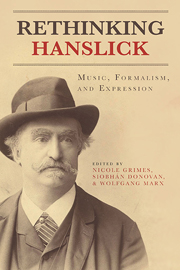Book contents
- Frontmatter
- Contents
- Foreword by Mark Evan Bonds
- Acknowledgments
- Abbreviations
- Chronology
- Introduction
- Part One Rules of Engagement
- Part Two Liberalism and Societal Order
- Part Three Memoirs and Meaning in Social Contexts
- 9 The Critic as Subject: Hanslick's Aus meinem Leben as a Reflection on Culture and Identity
- 10 “Faust und Hamlet in Einer Person”: The Musical Writings of Eduard Hanslick as Part of the Gender Discourse in the Late Nineteenth Century
- 11 Body and Soul, Content and Form: On Hanslick's Use of the Organism Metaphor
- Part Four Critical Battlefields
- Selected Bibliography
- List of Contributors
- Index
11 - Body and Soul, Content and Form: On Hanslick's Use of the Organism Metaphor
from Part Three - Memoirs and Meaning in Social Contexts
Published online by Cambridge University Press: 05 July 2013
- Frontmatter
- Contents
- Foreword by Mark Evan Bonds
- Acknowledgments
- Abbreviations
- Chronology
- Introduction
- Part One Rules of Engagement
- Part Two Liberalism and Societal Order
- Part Three Memoirs and Meaning in Social Contexts
- 9 The Critic as Subject: Hanslick's Aus meinem Leben as a Reflection on Culture and Identity
- 10 “Faust und Hamlet in Einer Person”: The Musical Writings of Eduard Hanslick as Part of the Gender Discourse in the Late Nineteenth Century
- 11 Body and Soul, Content and Form: On Hanslick's Use of the Organism Metaphor
- Part Four Critical Battlefields
- Selected Bibliography
- List of Contributors
- Index
Summary
It has been common practice since the early nineteenth century to compare a musical work with a “living organism,” a metaphor that Eduard Hanslick—like Richard Wagner, Franz Brendel, and many others—also employed, both in his treatise On the Musically Beautiful (1854) and in many of his reviews. That he rarely reflects on this practice is revealing of the underlying assumptions of Hanslick's aesthetic thinking, his musical preferences and antipathies. These unreflected, apparently self-evident paradigms are particularly relevant to the intellectual horizon of an author and his epoch. On the one hand, there is the tradition of German idealism in the wake of Kant, Schiller, Schelling, and Hegel, with its classical concept of “unity in diversity” [Einheit in der Mannigfaltigkeit], and its equation of “idea” [Idee] with “sensual and corporal phenomena” (i.e., the “content versus form” debate). On the other hand, there is the scientific-physiological thinking around 1830, that in part explicitly distances itself from idealism. This almost inexplicable tension between idealism and positivism/materialism, recently described as “idealist materialism” by Mark Burford, shapes both Hanslick's treatise and his musical preferences (which are inexplicably bound up with one another). The nuances of the organism concept may, however, allow for a new understanding of this matter. As idealist materialism was not only relevant for biology, physiology, medicine, philosophy, and aesthetics, but also for contemporary theories of governance and linguistics, conclusions drawn from an analysis of Hanslick's use of language may afford us an insight that extends beyond purely musical matters.
- Type
- Chapter
- Information
- Rethinking HanslickMusic, Formalism, and Expression, pp. 236 - 258Publisher: Boydell & BrewerPrint publication year: 2013



